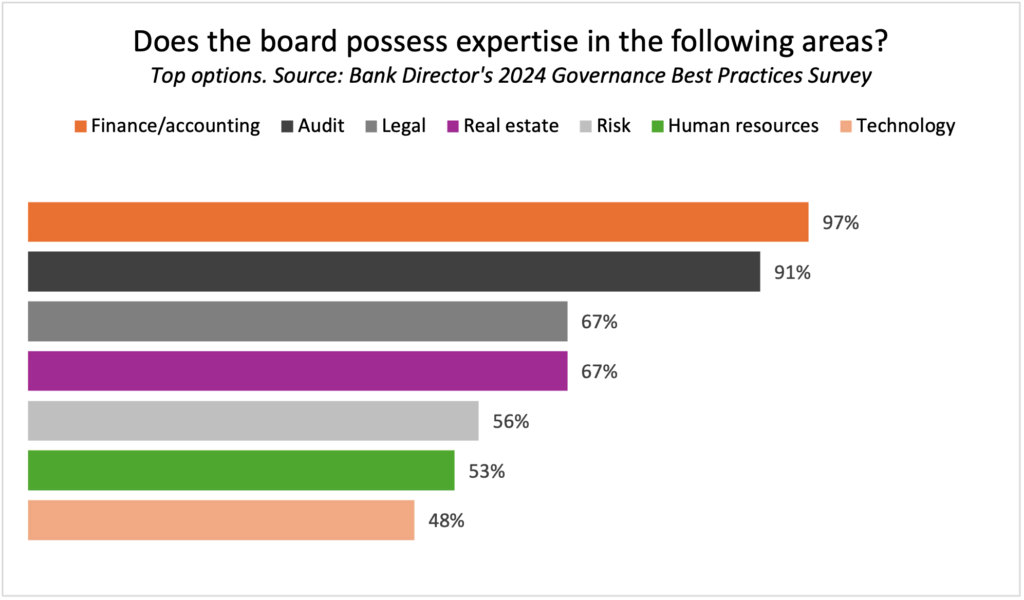Jackie Stewart is the Executive Editor of Bank Director. She is responsible for writing and editing features for the company’s weekly newsletter and quarterly print magazine and oversees sponsored research reports. Jackie is particularly interested in community banking and M&A activity. She previously served in a number of reporter and editor roles with American Banker, including executive editor of American Banker Magazine. She has also covered retirement issues for Kiplinger and spent two years teaching middle school literacy in the Bronx, New York, through Teach For America.

The Skills and Attributes of an Effective Director
Directors should have a variety of professional experiences, in addition to demonstrating certain personality traits, to help the board oversee management.
Building a diverse board starts with assembling a group of directors who collectively bring expertise from a range of different fields.
For banks, this can mean having board members with backgrounds in areas such as finance and accounting, risk management, regulatory matters and technology. Finding personalities that work well together is also essential in creating an environment where asking questions is not only tolerated but encouraged.
A bank’s board is responsible for corporate governance, and this mandate touches on audit, compliance, legal issues, technology and risk, says Patricia Callan, a director at $8.4 billion Southside Bancshares in Tyler, Texas. Because of that, having board members with the right expertise is a necessity.
“A good board member needs to be a strategic thinker and a problem solver,” Callan adds. “It’s critical to understand when to address these areas.”
Banks have long been concerned about having a diverse range of skill sets on a board, especially as the demands of serving as a director have grown and the requirements have become more sophisticated. But this may only grow in importance during this second Trump administration and programs to promote diversity are rethought.
“In general, companies might still be thinking about diversity, but they might start thinking about it in different ways and not necessarily based on demographics,” says Scott Yonker, a professor of finance in the business school at Cornell University. “There might be a focus on diversity of skill sets. The academic literature says that a diversity of backgrounds has some positive effects.”
Finance is one of the most important areas for bank board representation, says Alan Kaplan, founder and CEO of Kaplan Partners, an executive search and board advisory firm. “These are people who can be on the audit committee because they have a background in accounting or finance,” Kaplan adds. “This could be someone who has been a chief financial officer.” Understanding a different balance sheet structure and how banks really work will help a new director ramp up more quickly.
In Bank Director’s 2024 Governance Best Practices Survey, 97% of responding directors and CEOs said their board had finance or accounting expertise. Other critical areas include regulation, risk management and technology.
But assembling individuals with all of the necessary skills for a successful bank board can be incredibly difficult, especially for institutions in smaller or more rural markets. For instance, 37% of banks with under $500 million in assets said they had someone with technology experience on their board, according to the survey, compared to 48% overall.
To make the task easier, banks should look for individuals with experience in other industries who are familiar with issues similar to financial services. For instance, an expert who works in healthcare or insurance could be a good fit for a bank board looking to bolster its knowledge in dealing with areas such as banking regulations or risk management.
Callan is a principal at Callan Consulting, a firm that provides sales management, insurance and healthcare-related consulting services. She says this background has served her well as a bank director. “The government regulation is extreme on both sides in banking and in healthcare,” she adds. “That’s a really important facet. It has helped me to provide more to the bank as it has grown.”
Another way to recruit a director with a harder-to-find skill is to expand the geographic search area, Kaplan says. Some community banks feel strongly about recruiting directors from a more narrow area to ensure the individual understands their core markets. And it’s certainly important to have representatives who know the communities the bank serves.
But restricting the search to a limited geography could mean the bank is missing out on more sophisticated candidates or candidates with experience at larger companies. That can be especially true for a bank located in a rural area, Kaplan says. The board should consider if geographic proximity is the most important consideration when recruiting a new member.
“If you want to build a more diverse board, you may have to fish in different ponds than your normal community organizations and country clubs that the board members may belong to,” Kaplan adds.
Besides more technical skills and knowledge, the board should also consider the softer skills that a candidate brings to the table. These skills would include being a good listener, having a high emotional intelligence and displaying equanimity, says Robert Voth, who leads the North American consumer and commercial financial services practice at the leadership advisory and executive recruitment firm Russell Reynolds Associates.
Having directors who are able to listen before reacting can help create a culture of collaboration and collegiality. A director with high emotional intelligence will be able to ask hard questions in a way that doesn’t put management on the defensive and even say no to ideas without souring relationships. And equanimity means the board member has the ability to remain calm and composed, no matter the situation.
“The way I look at it is that the technical skill set is secondary to the culture of the board,” Voth says. “You can have a board with the most top-notch skills but if they don’t get along with each other, then the board will fail the company.”
Finding someone who shares the overall strategic vision of Southside’s board is critical when recruiting a new director, says Callan. That’s not to say the board is looking for individuals who will rubber stamp any decisions. Instead, having a positive, cohesive culture creates an environment where it is safe, and even encouraged, to ask tough questions of management and make difficult decisions.
“The board candidate’s value system has to be similar,” she adds. “Be careful to consider those values as you are choosing your board. You could recruit someone who is a great financial wizard but if they can’t identify with the bank’s strategy and culture, the relationship may not be optimal for the bank.”
This article has been updated to include a full description of Russell Reynolds Associates’ services.



